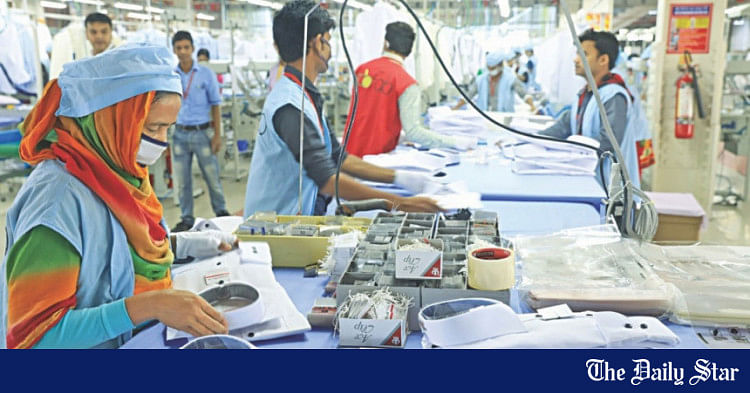This is an opportune time for Bangladesh to recalibrate structural transformation towards an inclusive and greener economy. The policies that enabled the country to increase its footprint in manufacturing—albeit mainly in the ready-made garment sector (RMG)—may not work in the future. Policymakers must choose whether to continue a selective export-driven focus while protecting the rest of the economy, or opt for a more outward alignment of the economy for growth and jobs.
There is empirical evidence that export-driven growth was one of the major drivers of economic development in East and Southeast Asia. Several countries in the region started their industrial journey with RMG, but over time diversified and moved vertically along the value chain. Although export-led growth was pursued as a policy objective, the degree of economic openness varied. With a relatively smaller consumer base, Singapore followed largely laissez-faire economic regulations while limiting foreign capital to strategic sectors. Larger economies such as Indonesia pursued a dualistic approach by opening parts of the economy for exports and investments while protecting some sectors from competition through state-owned enterprises or investment restrictions.
In Bangladesh, there is a strong correlation between exports, more specifically RMG exports, and economic growth. The share of RMG exports in the national output increased from less than six percent in 1990 to over 13 percent in 2023, after peaking at 20 percent in 2012, according to the World Bank. Although weakening, the positive relationship between RMG exports and jobs is also visible.
It is fair to say that Bangladesh’s export-led growth story has essentially been an RMG story. There have been limited spillover effects for other sub-sectors. RMG products still represent around 85 percent of Bangladesh’s exports. There are also worrying signs that the RMG-led growth has already peaked. In the last decade, the share of private sector investment has remained stagnant at around 22 percent of GDP.
Given its population size and potential, Bangladesh has not been able to attract enough foreign direct investment (FDI). Between 2010 and 2022, annual FDI inflow averaged $2.2 billion, significantly lower than Vietnam and Indonesia, where it averaged $12 billion and $18 billion, respectively, according to UNCTAD. An overly regulated economy, red tape, and weak enforcement of business regulations have often been cited as barriers to domestic and foreign investments in Bangladesh.
From 133 in 2003, Bangladesh’s ranking on the Ease of Doing Business Index improved to 119 but fell as low as 168 out of 190 countries in 2020, the last year before the report was discontinued. On the Global Competitiveness Index, Bangladesh’s ranking was 102 in 2023, which is quite low and has barely improved in the last five years. Bangladesh performs poorly on trade, investment, and financial indicators, broadly indexed as economic freedom. Between 2013 and 2023, the economic freedom score of Bangladesh increased from just 52 to 54.
A narrowly defined export-led growth model can limit the diffusion of technology and learning into other sectors of the economy. Protecting selected industries and businesses to build domestic capabilities is justified if measures are time-bound and not too distortionary for the economy, which can result in skewed distribution of income and wealth.
Relying on a few export goods without gradually opening and reforming the rest of the economy is bound to run its course. Many analysts have pointed out the anti-export bias that a long period of protection has created for the non-RMG sectors in Bangladesh. There is a need for change, but the sequencing of reforms and timing is also critical.
The first task should be to address regulatory bottlenecks, making it easier for businesses to invest and operate in the country. These can be followed by a gradual rationalisation of import tariffs that should be underpinned by a rigorous cost-benefit analysis. These reforms can go alongside trade facilitation support, incentivising already established local companies to start looking outwards.
The geo-economic factors also necessitate a change in the current course of action. We are living in a world markedly different from the 1990s when Bangladesh’s RMG sector took off. Many low- and middle-income countries are vying to be the supplier of choice for global buyers. Rapid technological changes are also profoundly affecting the economy. And, increasingly, businesses are required to adhere to higher environmental, social, and governance (ESG) standards.
Bangladesh’s dualistic growth model must be adapted to meet these new demands. Recent political changes have created momentum for economic and business reforms, providing a unique opportunity for policymakers to recalibrate the economic model and make it fit for the future—a model of economic growth that is good for shared prosperity and the natural environment.
Owais Parray is country economic adviser in UNDP Bangladesh.
Views expressed in this article are the author’s own.
Follow The Daily Star Opinion on Facebook for the latest opinions, commentaries and analyses by experts and professionals. To contribute your article or letter to The Daily Star Opinion, see our guidelines for submission.


